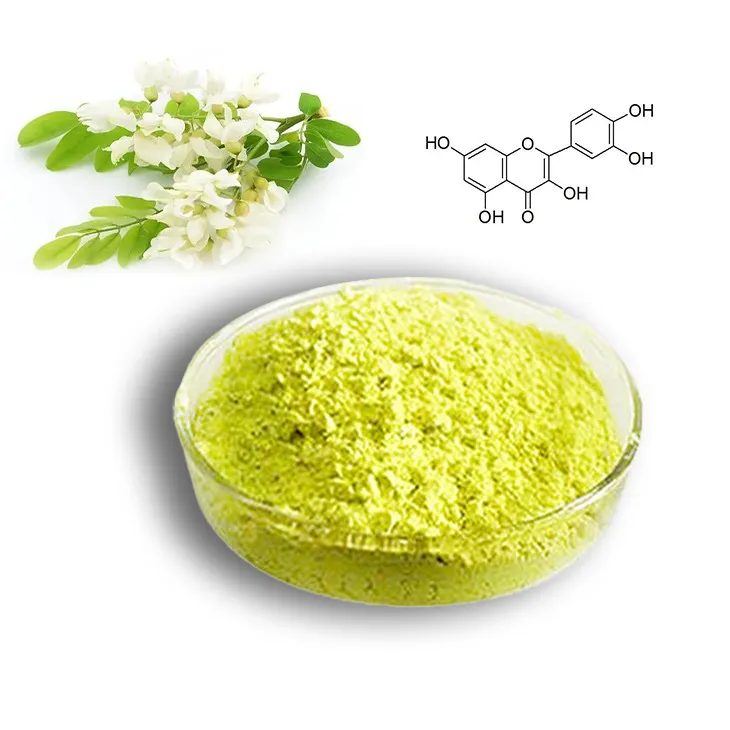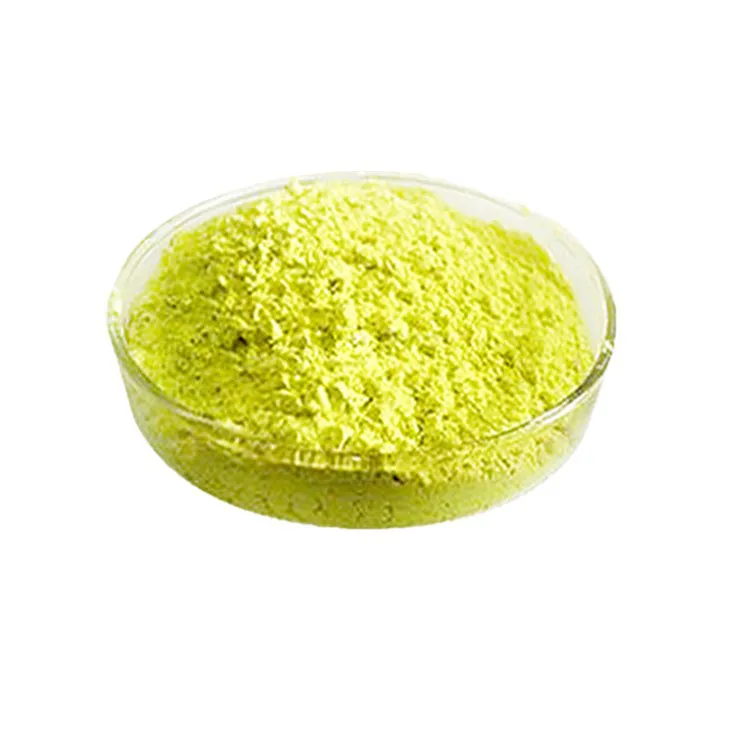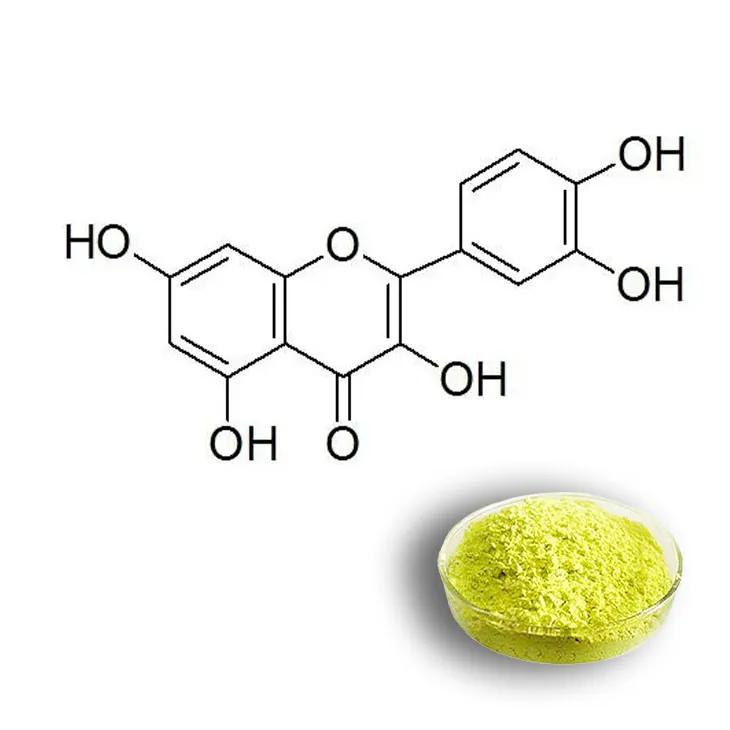- 0086-571-85302990
- sales@greenskybio.com
5 Benefits of Quercetin + Dosage, Side Effects
2024-11-11

1. Introduction to Quercetin
Quercetin is a flavonoid that is widely distributed in nature. It can be found in many fruits, vegetables, grains, and herbs. This natural compound has been the subject of numerous scientific studies due to its potential health - promoting properties.

2. The Five Key Benefits of Quercetin
2.1 Antioxidant Activity
Quercetin is a powerful antioxidant. It has the ability to scavenge free radicals in the body. Free radicals are unstable molecules that can cause damage to cells, DNA, and proteins. By neutralizing these free radicals, quercetin helps to protect the body from oxidative stress, which is associated with various diseases such as cancer, heart disease, and neurodegenerative disorders.
2.2 Anti - Inflammatory Action
Another important benefit of quercetin is its anti - inflammatory effect. Inflammation is a natural response of the body to injury or infection, but chronic inflammation can lead to many health problems. Quercetin can inhibit the production of inflammatory mediators such as cytokines and prostaglandins, thereby reducing inflammation in the body. This makes it potentially useful in the treatment of inflammatory conditions like arthritis, asthma, and inflammatory bowel disease.
2.3 Contribution to Cardiovascular Well - being
Quercetin also offers several benefits for cardiovascular health. It can help to lower blood pressure by relaxing blood vessels. Additionally, it may reduce cholesterol levels, particularly LDL (bad) cholesterol. By improving blood lipid profiles and blood pressure, quercetin may lower the risk of developing heart disease and stroke.
2.4 Support for the Immune System
The immune system can also be enhanced by quercetin. It has been shown to stimulate the activity of immune cells such as macrophages and natural killer cells. These cells play a crucial role in fighting off infections and cancer cells. Moreover, quercetin may help to regulate the immune response, preventing it from overreacting or underreacting.
2.5 Possible Anti - Cancer Influence
There is growing evidence suggesting that quercetin may have anti - cancer properties. It can interfere with the growth and spread of cancer cells in several ways. For example, it may induce apoptosis (programmed cell death) in cancer cells, inhibit angiogenesis (the formation of new blood vessels that supply tumors), and prevent the metastasis of cancer cells. However, more research is needed to fully understand its potential in cancer prevention and treatment.

3. Dosage of Quercetin
The appropriate dosage of quercetin can vary depending on several factors, including the individual's age, health condition, and the purpose of supplementation.
For general health promotion, a daily dose of 500 - 1000 mg of quercetin may be sufficient. However, in some cases, such as for treating specific health conditions, higher doses may be required. It is important to note that high - dose supplementation should be done under the guidance of a healthcare professional.
Quercetin supplements are available in different forms, such as capsules, tablets, and powders. The dosage form can also affect the appropriate amount to be taken. For example, if using a quercetin powder, it may be necessary to measure the dose accurately.

4. Side Effects of Quercetin
While quercetin is generally considered safe for most people when taken at appropriate doses, there are some potential side effects to be aware of.
- Gastrointestinal Disturbances: Some people may experience mild gastrointestinal side effects such as stomach upset, nausea, or diarrhea. These symptoms are more likely to occur at higher doses or when starting supplementation.
- Allergic Reactions: In rare cases, individuals may be allergic to quercetin. Allergic reactions can range from mild skin rashes to more severe symptoms such as difficulty breathing or swelling of the face, lips, or tongue. If any signs of an allergic reaction occur, supplementation should be stopped immediately and medical attention sought.
- Interactions with Medications: Quercetin may interact with certain medications. For example, it may enhance the effects of blood - thinning medications, increasing the risk of bleeding. It can also interact with some antibiotics and immunosuppressive drugs. Therefore, it is important to inform your healthcare provider if you are taking any medications before starting quercetin supplementation.

5. Conclusion
Quercetin is a natural compound with a wide range of potential health benefits. Its antioxidant, anti - inflammatory, cardiovascular, immune - supporting, and possible anti - cancer properties make it an interesting substance for further research and potential use in promoting health. However, when considering quercetin supplementation, it is crucial to be aware of the appropriate dosage and potential side effects to ensure its safe and effective use.
FAQ:
What is the main antioxidant mechanism of quercetin?
Quercetin is a powerful antioxidant. Its main antioxidant mechanism is to scavenge free radicals. Free radicals are unstable molecules that can damage cells and DNA. Quercetin donates electrons to these free radicals, making them more stable and thus reducing oxidative stress in the body.
How does quercetin contribute to cardiovascular health?
Quercetin can contribute to cardiovascular health in several ways. It may help reduce inflammation in blood vessels, which is associated with a lower risk of heart disease. It also has the potential to lower blood pressure by relaxing blood vessel walls. Additionally, quercetin might improve lipid profiles by reducing levels of bad cholesterol (LDL) and increasing levels of good cholesterol (HDL).
What is the recommended dosage of quercetin?
The recommended dosage of quercetin can vary depending on the individual and the purpose of use. For general health benefits, a common dosage range is around 500 - 1000 mg per day. However, it's always best to consult a healthcare professional before starting any new supplement regimen, especially if you have underlying health conditions or are taking other medications.
Are there any side effects of quercetin?
Quercetin is generally considered safe for most people when taken in appropriate doses. However, some people may experience mild side effects such as stomach upset, headache, or tingling sensations. In rare cases, high doses may cause more serious side effects. People with kidney problems should be especially cautious as quercetin may affect kidney function.
How does quercetin support the immune system?
Quercetin supports the immune system in multiple ways. It can enhance the function of immune cells, such as macrophages and lymphocytes. It also has anti - inflammatory properties, which can help the immune system function more efficiently by reducing excessive inflammation that can sometimes suppress immune responses. Additionally, quercetin may help the body fight off infections by modulating the immune system's response to pathogens.
Related literature
- The Antioxidant and Anti - Inflammatory Properties of Quercetin: Implications for Cardiovascular Health"
- "Quercetin and Immune Function: A Review of the Evidence"
- "Quercetin: A Promising Agent in Cancer Prevention? Current Evidence and Future Perspectives"
- ▶ Hesperidin
- ▶ citrus bioflavonoids
- ▶ plant extract
- ▶ lycopene
- ▶ Diosmin
- ▶ Grape seed extract
- ▶ Sea buckthorn Juice Powder
- ▶ Beetroot powder
- ▶ Hops Extract
- ▶ Artichoke Extract
- ▶ Reishi mushroom extract
- ▶ Astaxanthin
- ▶ Green Tea Extract
- ▶ Curcumin Extract
- ▶ Horse Chestnut Extract
- ▶ Other Problems
- ▶ Boswellia Serrata Extract
- ▶ Resveratrol Extract
- ▶ Marigold Extract
- ▶ Grape Leaf Extract
- ▶ blog3
- ▶ blog4
- ▶ blog5
-
Organic Tongkat Ali extract powder factory.
2024-11-11
-
How to make powder with ashwagandha extract.
2024-11-11
-
Rosehip extract manufacturers from China.
2024-11-11
-
The best cat's claw extract in nature.
2024-11-11
-
Chinese Dandelion Leaf Extract Suppliers.
2024-11-11
-
Genistein
2024-11-11
-
White mustard seed extract
2024-11-11
-
Tongkat Ali Extract
2024-11-11
-
Curcumin
2024-11-11
-
Almond Extract Powder
2024-11-11
-
Camu Camu Extract
2024-11-11
-
Chaste Berry Extract
2024-11-11
-
Maca Extract
2024-11-11
-
Oat Straw Extract Powder
2024-11-11
-
Okra Extract
2024-11-11





















